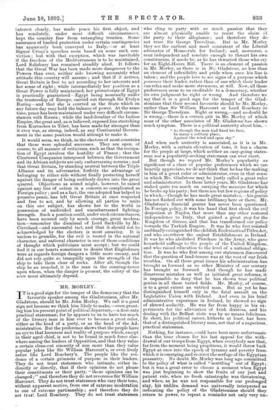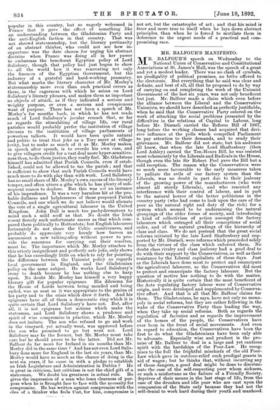MR. MORLEY.
IT is a good sign for the temper of the democracy that the favourite speaker among the Gladstonians, after Mr. Gladstone, should be Mr. John Morley. We call it a good sign not because we think him likely to make,—even grant- ing him his present point of political departure,—a first-rate practical statesman; for he appears to us to have too much of the literary man in him ever to become a great ruler, either as the head of a party, or as the head of the Ad- ministration. But the preference shows that the people have an eye to that keenness and reality of purpose which, except in their aged chief, is not to be found in much force else- where among the leaders of Opposition, and that they value a certain clean-cut sincerity of aim more than they value popular jokes like Sir William Harcourt's, or even lively satire like Lord Rosebery's. The people like the evi- dence of a certain grimness of purpose in their leaders. They do not trust statesmen who intimate, either in- directly or directly, that if their opinions do not please their constituents or their party, "those opinions can be changed ; " and therefore they do not reverence Sir William Harcourt. They do not trust statesmen who vary their tone, without apparent motive, from one of extreme moderation to one of extreme partisanship ; and therefore they do not trust Lord. Rosebery. They do not trust statesmen who cling to party with so much passion that they are almost physically unable to resist the claim of the party to their allegiance ; and therefore they do, not trust Sir George Trevelyan. But in Mr. Morley they see the earliest and most consistent of the Liberal advocates of Home-rule for Ireland ; and, moreover, a. man independent and resolute enough to thwart his own constituents, if needs be, as he has thwarted those who cry for an Eight-Hours Bill. There is an element of passion in Mr. Morley, as there is in Mr. Gladstone, no less than an element of inflexibility and pride when once his line is- taken ; and the people love to see signs of a purpose which• possesses their leader, rather than of one which their leader can relax and make more strenuous, at will. Now, all these preferences seem to us creditable to a democracy, whether its own judgment be right or wrong. And therefore we say that it is a good sign for the temper of the Glad.- stonia.ns that their second favourite should. be Mr. Morley,. rather than Sir William Harcourt or Lord Rosebery or - Sir George Trevelyan. Right or wrong,—and no doubt he is wrong,—there is a certain grit in Mr. Morley of which none of the other associates of Mr. Gladstone has shown much symptom. There is a political austerity about him,— " As though the man had fixed his face,
In many a solitary place, Against the wind and open sky."
And when such austerity is associated, as it is in Mr. Morley, with a certain elevation of tone, it has a charm for the people at large, which neither an easy-going states- man nor a popularity-seeking statesman can ever exert.
But though we regard Mr. Morley's popularity as- significant of a class of popular preferences which we can heartily appreciate, we do not think that he has the making_ in him of a great ruler or administrator, even in that sense- in which Mr. Gladstone may be justly called a great ruler and administrator. In these latter years, Mr. Gladstone has. staked quite too much on carrying the measure for which he broke up his party; but there are but few regions of policy in which,—though he has made great mistakes,—his genius- has not flashed out with some brilliancy here or there. Mr. Gladstone's financial genius has never been questioned. In Foreign policy, it was his hand that first shook the evil. despotism at Naples, that more than any other restored independence to Italy, that gained a great step for the - Kingdom of Greece, and that has transformed our policy. towards the Turkish Empire. It was he who first resisted- and finally extinguished the childish Ecclesiastical Titles Act, and who overthrew the unjust Establishment in Ireland.
It was he who abolished Purchase in the Army, who gave- household suffrage to the people of the United Kingdom,. and who raised education to the level of a national obliga- tion. It was he who first among our statesmen discovered that the question of land-tenure was at the root of our Irish troubles. On all these great issues his administration has brought us forward as no other Ministry of our century has brought us • forward. And though he has made- disastrous mistakes as well as initiated great reforms, it is impossible to deny that he has shown true political genius in all these varied fields. Mr. Morley, of course,. is to a great extent an untried man. But as yet he has distinguished himself only in the fatal assault on the Legislative Union with Ireland. And even in his brief administrative experience in Ireland, he showed no sign of shrewd. audacity. He was far from happy in his ex- periments for the alleviation of Irish distress, and his dealing with the Belfast riots was by no means felicitous. In short, his political career, hitherto at least, has been that of a distinguished literary man, not that of a sagacious,.. practical statesman.
Nothing, for instance, could have been more unfortunate than the time chosen for his last appeal for the with- drawal of our troops from Egypt, when everybody saw that,- far from the moment being propitious, it would throw back Egypt at once into the epoch of tyranny and poverty from.. which it is emerging, and re-rivet the serfage of the Egyptian, peasantry. No doubt Mr. Morley was long ago committed to the policy of what is called " scuttling " out of Egypt ;. but it was a great error to choose a moment when Egypt was just beginning to show the fruits of our just and patient rule, when no fresh catastrophe was threatening, and when, as he was not responsible for our prolonged stay, his sudden demand was universally interpreted as indicating the policy of the Gladstonians should they return to power, to repeat a reminder not only very un- popular in this country, but so eagerly welcomed in France that it gave the effect of something like an understanding between the Gladstonian Party and the anti-English faction in that country. That was not shrewd statesmanship, but the literary pertinacity of an abstract thinker, who could not see how in- opportune was the date chosen for urging his abstract doctrine when France was doing all in her power to embarrass the beneficent Egyptian policy of Lord Salisbury, though that policy had just begun to show to all the world how it was renovating not only the finances of the Egyptian Government, but the industry of a grateful and hard-working peasantry. But what marks the literary character of Mr. Morley's statesmanship more even than such practical errors as these, is the eagerness with which he seizes on Lord Salisbury's literary phrases, and makes them as important as objects of attack, as if they indicated a serious and weighty purpose, or even a serious and conspicuous want of purpose. There has not been a speech of Mr. Morley's for months back, in which he has not made much of Lord Salisbury's jocular remark that, so far as regards the stimulating of village life, our rural parishes would probably prefer the institution of village circuses to the institution of village parliaments of powerless talkers. It would have been quite natural and politic to treat that joke as a Tory sneer at village levity, but to make as much of it as Mr. Morley makes, in speech after speech, is to overdo his own case, and to give villagers credit for a vast deal more hyper-sensitive- ness than, to do them justice, they really feel. Mr. Gladstone himself has admitted that Parish Councils, even if estab- lished, could not be allowed to tax the parish ; and that is sufficient to show that such Parish Councils would have much more to do with play than with work. Lord Salisbury has no small share of Mr. Morley's own excess of the literary temper, and often utters a gibe which he has plenty of sub- sequent reason to deplore. But this was not an instance of his imprudence. It was a very harmless hit at the pro- bable dullness and helplessness of these proposed Parish Councils, and one which we do not believe would alienate the vote of a single agricultural labourer in the United Kingdom. John Bull is much too pachydermatous to mind such a mild scoff as that. No doubt the Irish resent fiercely such unfortunate sneers as that which com- pared them politically to Hottentots; but English labourers fortunately do not share the Celtic sensitiveness, and probably do appreciate very keenly how barren an amusement a new talking-shop without power to pro- vide the resources for carrying out their resolves, must be. The importance which °Mr. Morley attaches to this utterly insignificant and perfectly safe joke, only shows that he has exceedingly little on which to rely for pointing the difference between the Unionist policy as regards local government in England, and the Gladstonian policy on the same subject. He works Lord Salisbury's irony to death because be has nothing else to harp upon. No doubt Mr. Morley has himself a very happy literary gift for popular epigrams. His dilemma for the House of Lords between being mended and being ended, was as neat as it was appropriate to the genius of his party and to the crisis which drew it forth. And his epigrams have all of them a democratic ring which it is quite certain that Lord Salisbury's have not. But, after all, it is not epigrams but actions which make the statesman, and Lord Salisbury shows a prudence and spirit of wise compromise in practice, which Mr. Morley does not imitate. The son who refused to go and work in the vineyard, yet actually went, was approved before the son who promised to go but went not. Lord Salisbury may be the former, but Mr. Morley must take care lest he should prove to be the latter. Did not Mr. Balfour do far more for Ireland in six months than Mr. Morley did in the same time ? And has not even Lord Salis- bury done more for England in the last six years, than Mr. Morley would have so much as the chance of doing in the next six years, if he came in with a pledge to establish an Irish Legislature and Administration in Dublin ? He is great in criticism, but criticism is not the chief gift of a statesman. We doubt his greatness in actual rule. He gives the impression of a man who loses clearness of pur- pose when he is 15fought face to face with the necessity for compromise. He has written against compromise with the .e/an of a thinker who feels that, for him, compromise is not art, but the catastrophe of art ; and that his mind is freer and more true to itself when he lays down abstract principles, than when he is forced to mutilate them in deference to the urgent needs of a practical and com- promising race.







































 Previous page
Previous page